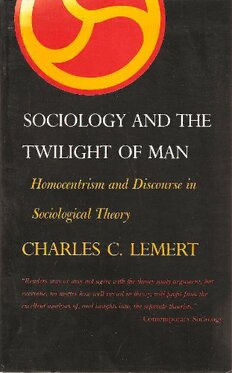
Sociology and the Twilight of Man: Homocentrism and Discourse in Sociological Theory PDF
01980·0.48 MB·English
Most books are stored in the elastic cloud where traffic is expensive. For this reason, we have a limit on daily download.
Preview Sociology and the Twilight of Man: Homocentrism and Discourse in Sociological Theory
Description:
A critique of modern sociological theory, this brilliant new work rather than announcing the twilight of man accepts the event both as an intellectual conclusion and an empirical fact, and proceeds systematically to examine the alternatives beyond the Weber-Durkheim-Parsons episteme. Addressing himself to the issues of pluralism in sociological theory, Lemert rigorously examines representative writings of important theorists in America and Europe, including the writings of Homans (Lexical Explanation), Blalock (Theory Constructionism), Parsons (Analytic Realism), Blumer (Symbolic Interactionism), Schutz, Berger, Luckmann (Phenomenology), Cicourel (Ethnomethology), and Habermas (Critical Theory). Lemert challenges the celebrated pluralism hypothesis in his argument that recent sociological theory is not so pluralistic after all and has not made particular use of available styles of thinking. Sociology and the Twilight of Man is an important contribution to the modern sociological enterprise for several reasons. First, it raises basic questions about the progress made beyond earlier theoretical writings. Second, it questions the explanatory force of current theories. Third, it questions whether contemporary theory can continue to develop in a meaningful way without a profound reexamination of its assumptions and premises. And fourth, it demonstrates the value of discursive analysis to theoretical studies. Lemert’s critique could lead to fundamental revisions of sociologists’ perception of their discipline.
See more
The list of books you might like
Most books are stored in the elastic cloud where traffic is expensive. For this reason, we have a limit on daily download.
